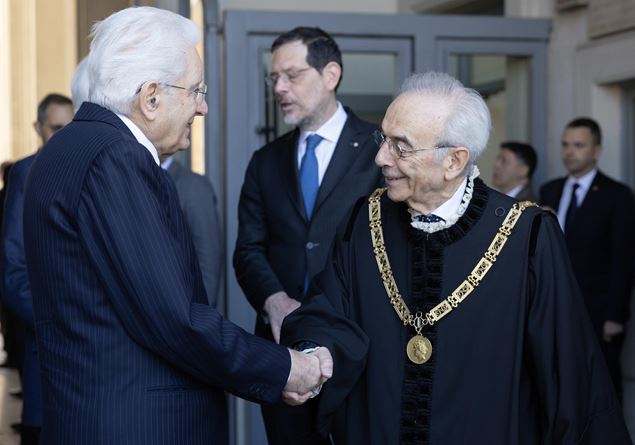“The independence of the judiciary is a pillar of the state of law and must be preserved. Comparison and criticism is always possible. The judges are not elected and their legitimacy is found in the Motivations of their measures, which are however critical, even harshly. It is not acceptable that there may be personal attacks Because here we go to a different ground, of delegitimization of the judiciary and is then a slippery soil that must be avoided at all costs. A system without judges would be worrying, ours is a balanced system and is a system that contains antidotes and tools to stem possible debuts ».
He said it on April 11, with calm but clear words the president of the Constitutional Court, Giovanni Amorosowhich took over in January to Augusto Barbera, During the press conference following the extraordinary meeting in which he had presented in the presence of the President of the Republic Sergio Mattarella the last year of the Consulta activityfinally complete after the long stall on the election of four judges of parliamentary appointment.
Words that have come after during a question time in the Senate the Minister of Justice had stated: “If the number of prisoners increases, it is not the fault of the government, but it is the fault of those who commit crimes and the judiciary that puts them in prison”, arousing the reaction of the associated judiciary that on April 15 will meet the minister and who had pointed out how the judiciary has the duty to apply the laws, then partially recalibrated words, Having made to discuss also because they arrived shortly before the entry into force of the Security Decree, containing many tightening penalties for different crimes.
During the ceremony on the activity of Consulta 2024, Amoroso had started his report by remembering the fundamental role of the rule of law as a bulwark of democracy: «The future has become uncertain and in the global scenario various parameters seem in rapid and unpredictable change. But the rule of law still constitutes an anchoring of living together as a civil consortium with commonality of fundamental values and principleswho give body to the founding pact of the company “. In this regard, he then recalled mutual limits in the separation of powers: in particular he mentioned: “the limits of legislative power, also in the supranational context” and “the regulatory power of the government, in the form of both the decrease of urgency, and of the delegated legislation”as, “power subject to precise constitutional limits to protect parliamentary democracy, the role of parliament and institutional balances”.
To then refer to the Cirteri: “recurrent in recent jurisprudence (of the Constitutional Court, editor’s note”, of reasonableness and proportionality, to which the Court has appealed “always with motivated arguments, with the effect of cutting, for some time now, a more extensive area of union on the exercise of legislative power”. And it has however recalled that the area of the discretion of the Parliament is external to the legitimacy of the Court of the Court of the Court of the Court of the Court of the Court. Constitutional, since any political evaluation of the discretionary choices of the legislator is precluded to it ».
Amoroso recalled the important role of the dialogue between the courts in the European Union, the EU Court of Justice and the national constitutional courts; And he mentioned both the possibility “and the Court of the merits of the national legislation for violation of that of the European Union” on the merits “ both “the preliminary postponements ordered by the Court” “to the Court of Justice. On the topical issue concerning the special forms of differentiated autonomy for the regions with ordinary statute, recalled that this path is pursued” in compliance with the actual guarantee of the essential levels of services concerning civil and social rights and with content that do not affect social cohesion and national unity, the form of the form of the state, whose weakening can undermine the foundations of representative democracy ».
Regarding the dialogue with the legislator, it recalled: “The limit remains, beyond which there is the discretion of political choices, but in awareness and respecting this limit the Court is called to give protection to fundamental rights and to carry out its mission as judge of the laws in the wider context of loyal institutional collaboration”.
During the press conference, urged by a question, Amoroso also intervened on the topic of prisons, after the Court opened to spaces for affectivity in prison, although with a graduality dictated by the structures to be adapted, e He clearly defined: “A tragedy the theme of suicides” of prisoners, and reiterated article 27 of the Constitution which provides that the penalty must propose a “unrealized re -educational” purpose, remembering that those in prison lives conditions of “fragility”.








